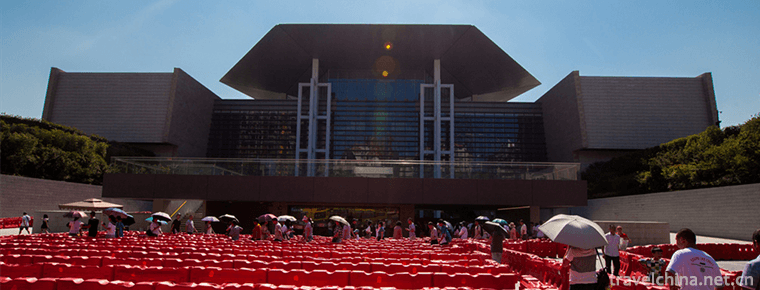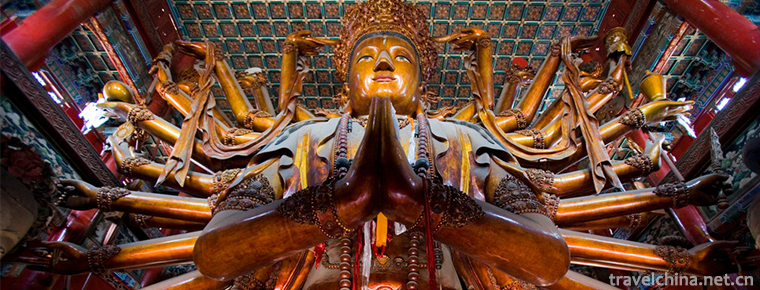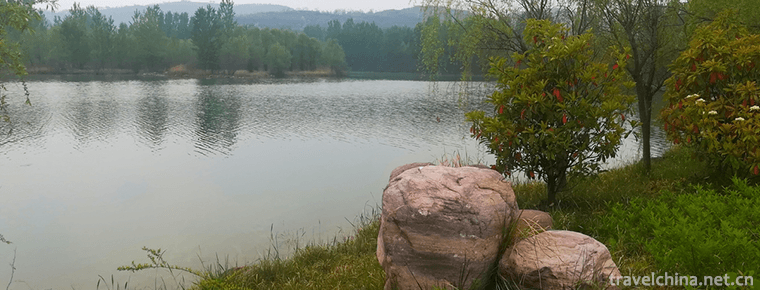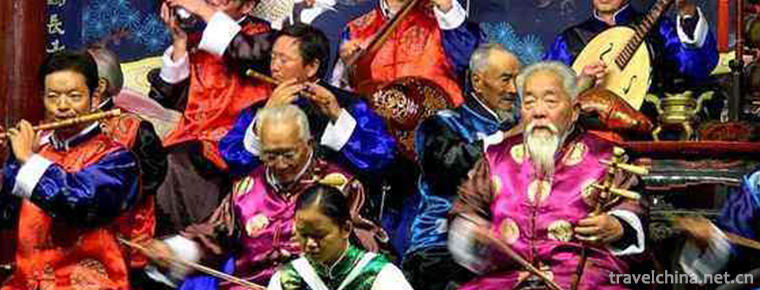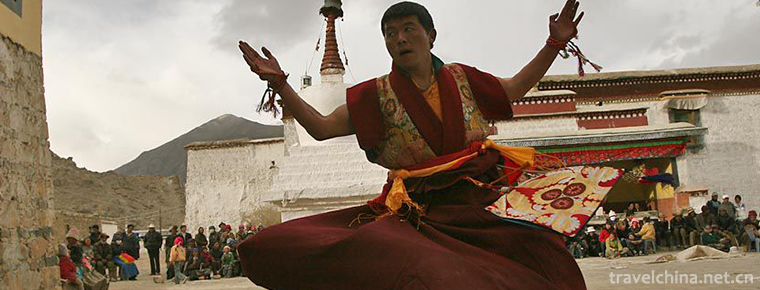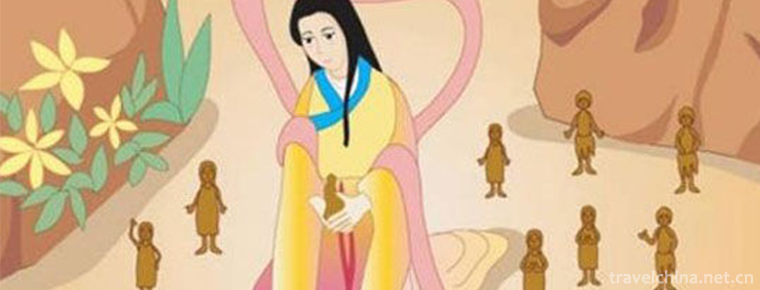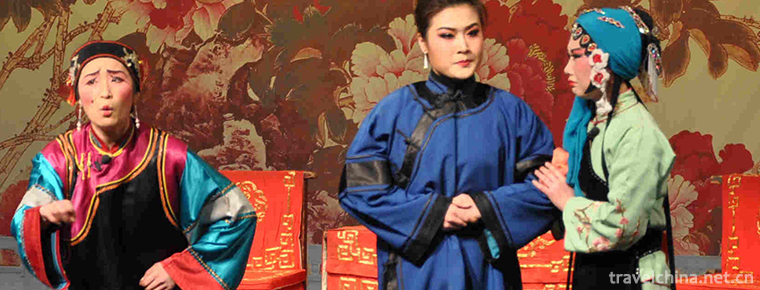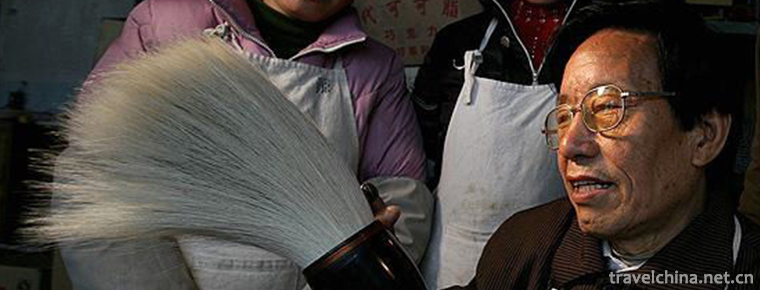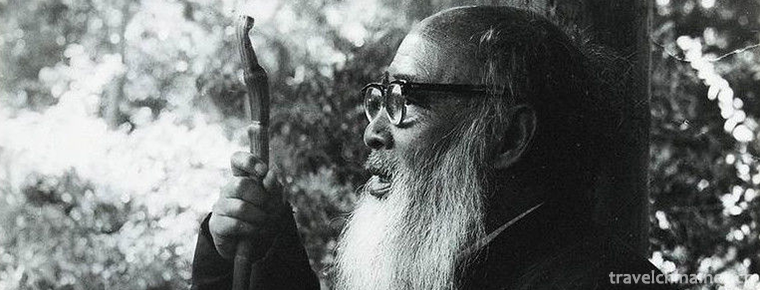PuXian opera
PuXian opera
Puxian Opera is one of the oldest operas in China. It originated in Tang Dynasty, became in Song Dynasty and flourished in Ming and Qing Dynasty. It is known as the "living fossil" of Southern Opera in Song, Yuan and Qing Dynasties. According to statistics, Puxian Opera has more than 5000 traditional operas, accounting for about one third of the total number of traditional operas in the country.
Puxian Opera is commonly known as "Xinghua Opera" because it was formed in Xinghua area (Putian and Xianyou nowadays) and sings in Xinghua dialect. In 1952, the name of Puxian Opera was changed with the approval of Fujian Cultural Bureau. It is popular in Putian, Xianyou two counties, northern Hui'an County and southern Fujian Xinghua dialect popular areas. On May 20, 2006, it was approved by the State Council to be included in the first batch of national intangible cultural heritage lists.
historical origin
Born in Puxian, Lei Haiqing was a famous court musician during the reign of Emperor Xuanzong of the Tang Dynasty. According to Supplementary Records of Ming Emperor, during the Anshi Rebellion, Anlu Mountain invaded Chang'an, capturing hundreds of disciples in Liyuan, among which Lei Haiqing was also one. Lei Haiqing, who was unwilling to play for the rebels, said that he could not go sick, but was forced to attend by Mount Anlu. Lei Haiqing refused to play for Anlu Mountain. He threw his Pipa on the ground and smashed it to pieces on the spot. Then he burst into tears. Anlu Mountain was furious and ordered Lei Haiqing to be dismembered.
After the Anshi Rebellion, Tang Suzong sacrificed Lei Haiqing, a loyal minister. Thereafter, Lei Haiqing became a god, and his loyal soul appeared repeatedly. Legend has it that a Puxian theatre troupe suddenly encountered a storm while performing at sea. Lei Haiqing appeared in the sky and saved everyone. At that time, the thunder character on his banner was covered by clouds, leaving only the second half of the word "thunder" in the word "Tian", so it was widely known as Marshal Tian. Lei Haiqing was successively praised by emperors of all dynasties as "Tang Zhongli Music Officer", "Head of Pear Garden in the World", "Marshal Tian", "Drama God" and so on. To this day, the Puxian Opera Troupe worships Lei Haiqing.
Puxian Opera is one of the oldest existing Chinese operas. Its original name is Xinghua Opera, which was developed on the basis of ancient Bai Opera. Puxian Opera originated in Tang Dynasty, became in Song Dynasty, flourished in Ming and Qing Dynasty and shined in modern times. Its performance is simple and elegant, many movements are deeply influenced by puppet opera, and it has a unique artistic style. Its singing is rich, which integrates the artistic characteristics of Puxian's folk songs, slang, ten tones and eight music, Buddhist opera, Song and Yuan Ci and Daqu Song and Dance. It sings in dialect and has a strong local color. So far, it still retains many musical elements of Song and Yuan Nan Opera, and is praised as "the activation of Song and Yuan Nan Opera". Stone".
Puxian Opera has more than 5000 existing traditional plays, of which 81 have the same titles or similar plots as Nanxi Opera, and more than 8000 traditional plays (including duplicates) performed by various opera troupes in the past dynasties are also preserved. Among them, the main plots of Nanxi Opera from the Song to the early Ming Dynasty still exist, including Wang Kui, Zhang Xie, Chen Guangrui, Wang Xiangwo Bing, Guohua and the Four Legends. Fifty-five copies of Mulian Opera, such as Fu Tiandou, are even retained. Drama expert Liu Nianzi, after examining the ancient scripts of Puxian Opera, admired that "Puxian Opera has only collected the number of Puxian Opera scripts. There is no other type of opera in the whole country or even in the world that can be compared with it. It is by far the richest library and Museum of theatrical art in the world.
The performance of Puxian Opera is simple and elegant, with rich and distinctive scientific media. Puxian opera has more than 1,000 cards, which can be distinguished according to different situations of different walks of life, or even "special opera". Each sentence of singing or reading is often accompanied by 2-3 or more acting actions, which is rare in other Chinese operas. And the performance is closely combined with gongs and drums, each set of movements are equipped with corresponding drums, very rigorous. Because of the ancient, rich and unique repertoire, opera cards and performances, Puxian Opera's special performance form and colorful stage manifestations are decided.
Puxian Opera originated in the Southern Song Dynasty. Guan Chen-mo, a Putian scholar in the Qing Dynasty, recorded in Miscellaneous Records of Central Fujian: "Xinghua Opera originated in the Song Dynasty and flourished in the Ming Dynasty." Liu Kezhuang (1187-1269), a Putian poet in the Southern Song Dynasty, saw Puxian Opera in his late years (1234-1236) in Duanping, his hometown. He once wrote poems describing the grand occasion at that time: "Smoking and pulling out of the city is busy, most people are busy in the theatre", "Children and daughters watch the city superiors together, talk about the divide between Chu and Han Dynasty", "Motou chivalrous seldom sing songs, Fang performs the Eastern Jin and Western Talks Capital". It can be seen that most of the performances are based on historical stories, and include some ancient and rare operas of the Song and Yuan Dynasties.
According to the survey and statistics in 1962, Puxian Opera has more than 5000 and 8000 traditional plays. Among them, Southern Opera related to Song and Yuan Dynasty, besides "Wang Kui" and "Cai Botao", which are known as "the head of drama", there are also "Zhang Xiezhuang", "Guohua", "Chen Guangrui", "Liu Wenlong", "Liu Xi", "Wang Xiang", "Zhu Maichen", "Zhao Dun" and "Killing Dog Ji". There are 81 copies of Xiaosun Tu, Su Qin, Liu Zhiyuan, Wang Shipeng, Lao Laizi, Dong Yong, Princess Lechang, Wang Huan, Jiang Shi and Gao Wenju, among which 57 copies have been handed down. Among them, Zhang Xiezhongyuan, one of the three "Song Yuan Opera Essays", is the earliest Southern Opera in China. This play has long been lost in all parts of the country, but it is only preserved in Puxian Opera. It has been performing for more than 700 years. According to the old artist Huang Wendi (1895-1967), the master passed on from generation to generation. During the reign of Qianlong in the Qing Dynasty (1736-1795), Putian performed the play on Tuesday after. Because of the homonym between "Xie" and "Qie" in Xinghua dialect, the title of the play is also called "Zhang Qian". Later, the script spread to the "Yulou Spring Class" in Guangxu Period of Qing Dynasty (1875-1908), which was performed by "Fushun Class" in the early years of the Republic of China.
The Ming and Qing Dynasties witnessed the development and prosperity of Puxian Opera. Yao Lu, a Putian scholar in the Ming Dynasty, recorded the special instrument flute used in Puxian Opera in Volume 8 of "Lushu" and "Fengpian". The actors'crowns are also distinctive: "Shu Ru, but when the ears have two hands to pull the ears." When I saw it in the theatre, it was still auspicious. Xie Zhaozhi, a Changle musician, wrote in Volume 12 of Wuzai figurines, "The Fourth Ministry of Things" that "Putian is good at drums and violins, but pronunciates Fujian tones more."
In the thirteenth year of Emperor Kangxi of the Qing Dynasty (1674), Jinlong set up a private private class: "gathering opera troupes to make a living" (Chen Hong's "Pu Bei Xiao Cheng" in the early Qing Dynasty). According to Chen Hong's "Pujing Xiaoji" of the Qing Dynasty, Kangxi 34 years (1695), "Spring Festival is celebrated on December 29, with 28 classes of opera performers, a total of 48 dressing-up shelves and a total of officials and people enjoying the New Year." In the 27th year of Qianlong reign (1762), Ruiyunzu Temple at Tingruiyun Temple outside Beiguan, Putian was built with a "Zhide Stele" and 32 classes of theatre troupes were listed, 12 classes more than those in the 35th year of Kangxi reign (1696), reaching its peak.
During the reign of Qingdaoguang (1821-1850), there were more than 60 opera troupes in Xianyou County alone. At that time, Chen Shengshao, a Hunan native, served as Xianyou County Decree. He recorded in the Book of Questions on Customs: "Folk joy, singing and dancing, marriage and funeral in alleys and lanes, are not popular, and the price is low. Heyi more than 60 classes, Fujian people commonly known as seven sub-classes. Music and local dialect, other county people all day long relative, not a word. According to the survey and statistics, from the middle of the Qing Dynasty to the end of the Qing Dynasty, Putian and Xianyou have more than 150 theatre troupes. From Kunqu Opera, Yiyang Opera and Ran Tan Opera, a large number of legendary plays were absorbed, and tunes were changed to songs, which enriched the traditional Puxian Opera repertoire.
In addition, Puxian Opera in the Qing Dynasty also appeared as a current drama based on current affairs or local stories. Among them are Wang Jiansheng, who exposed a case of miscarriage of justice caused by Xianyou County's order of Song Dynasty, and Lin Zexu's prohibition of smoking and Morphine Robbery, which reflected that after the invasion of Beijing by the Eight-Power Coalition Army, a high-ranking official of the Qing Dynasty was driven to sweep horse manure on the street by British and French invaders.
During the period of the Republic of China, Peking Opera and Fujian Opera were introduced into Putian one after another. The martial arts performance and chivalrous repertoire of Peking Opera, the institutional setting and performance techniques of Fujian Opera all had a certain impact on Puxian Opera. Backstage accompaniment also absorbs some of the "ten tones" and "eight music" from the original gongs, drums and simple musical instruments to the folk, as well as some instruments from other foreign operas, such as erhu, banhu, pipa, three strings, yangqin, Cello and so on, which makes Puxian opera more diverse and lyric.
In the 1920s and 1930s, Puxian Opera was very active. During the 9-12 years (1920-1923) of the Republic of China, the "Purple Star Tower" class went abroad for the first time and performed in Singapore and Malaysia such dramas as "Farzidu", "Zhengdong", "Zhengxi", "Three Kingdoms" and "Fengshenbang". In the 16-19 years (1927-1930) of the Republic of China, ShuangSailor Band went to Singapore and Malaysia to perform "Tianbao Tu", "Wagang Village", "Water Margin", "Three Kingdoms", "Fang Shiyu Dawutai", "Wang Kui and Guiying" and so on. During this period, a number of famous actors emerged in Puxian theatre, such as Huang Wendi, Fu Qiyun, Lin Yuan, Zheng Ying, Lin Furnace and Chen Jinbiao.
From the victory of the War of Resistance Against Japan to 1949, Puxian Opera was in a period of decline, with a large number of theatre troupes reduced, and artists changed their professions or scattered in the countryside.
After the founding of the People's Republic of China, Puxian Opera gained new life. In the early 1950s, the cultural authorities of Putian and Xianyou counties organized theatrical troupes and artists to study and implement the Party's literary and artistic policy and the policy of "changing the theatre, changing people and restructuring", and restored and reformed Puxian opera. There were more than 40 classes in Putian County, such as "New Republic", "Yihua Feng", "Sai Fenghuang", "New Folklore", "Sai Natural", "Xinxianhe" and "Xinquan Spring" in Xianyou County. More than 10 classes, such as "Xinyuhe", resumed their performances successively. They transplanted, adapted and staged a number of plays from the old liberated areas, such as "Running into Beijing by the King", "Lin Chong", "Three Days Zhujiazhuang", "Forcing Up Liangshan", "Nine Clothes" and "Blood and Tears Enemy", which were appreciated by the audience. From 1951 to 1952, a new type of theatre troupe (such as Putian County Typical Theatre Troupe and Xianyou County Experimental Theatre Troupe) was established successively, with cadres sent by cultural departments and leading groups elected by artists and people. In 1953, Putian County set up a mass theatre troupe, a labor theatre troupe, a Lisheng theatre troupe, a peace theatre troupe, and an advanced theatre troupe, and a carp voice troupe in Xianyou County, which promoted the work of script compilation.
In October 1952, the sorted traditional opera "Send a Thousand Miles" participated in the first Fujian Opera Festival and was well received. In August 1954, he sorted out the traditional operas Qinqiao, Ruilan Rain, Baihua Pavilion, Old Fruit Melon and Chunjiang, and participated in the second opera performance in Fujian Province. In September of the same year, the Puxian Opera Team went to Shanghai for the first time to participate in the East China Opera Festival and the performance award of Qinqiao. In September 1959, Puxian Opera Team participated in Fujian Provincial Tour Troupe, and took "After the Reunion" and "Three Strikes Wang Ying" to Beijing to perform for the 10th anniversary of the National Day. Party and state leaders Liu Shaoqi, Zhou Enlai and Zhu De attended the performance and took pictures with all the performers. In 1960, after reunion, known as "the great tragedy of Shakespeare", was produced by Changchun Film Studio as an opera art film.
In the 1950s, Puxian Opera also produced a number of plays reflecting modern life. In February 1956, Xianyou County Lisheng Opera Troupe produced Daniel and Calf and Sanjialin, and Putian County Experimental Opera Troupe produced Lichee Growing, which participated in the first report performance of Fujian Province's modern opera and was well received. "Daniel and the Calf" and "Sanjialin" also won the script creation award. In August 1958, Xianyou County Lisheng Opera Troupe created "Husband and wife red" and participated in Fujian Province's second modern opera report performance, which was well received. In 1959, Puxian Opera "After Reunion" and "Three Strikes of Wang Ying" went to Beijing to participate in the performance of the 10th anniversary of the National Day. Party and state leaders Liu Shaoqi, Zhou Enlai, Zhu De and Peng Zhen watched the performance and gave high praise .
At the same time, Putian and Xianyou county cultural authorities and scriptwriters have done a lot of work in excavating and sorting out traditional heritage and carrying out art education. They organized personnel to go deep into the folk, theatre troupes and dispersed artists, rescued, excavated and collected a large number of copies of performances, music tablets and historical relics, and recorded many oral copies. By July 1962, when the provincial excavation and rescue of traditional opera heritage was held in Putian, there were more than 5619 traditional operas collected, of which 1020 were newly discovered, more than 8,000 copies were performed, and more than 1,000 music opera cards. Compared with Nanci Narrative, 81 operas such as Zhang Qian had the same name as Southern Song and Yuan operas. As in 1956, Fu Tiandou, a play rescued and excavated from the folk, is a valuable literature with high research value. In addition, in the early 1960s, the manuscripts such as "Introduction to Traditional Science of Puxian Opera" and "Traditional Stage Art of Puxian Opera" were edited and printed successively. At the same time, under the guidance of experts of the Chinese Opera Research Institute, a historical investigation team composed of the Opera History Research Office of Fujian Opera Research Institute and local opera workers has made a four-month observation and observation survey in Putian and Xianyou, and has written hundreds of thousands of words of historical investigation report on Puxian Opera. In terms of art education, Putian and Xianyou counties held Puxian Opera Art Training Classes and Student Classes in 1956, rehearsed "Jingde Portrait" and "Carmine Shop" and participated in the report performance of Fujian Opera Art Training Class.
During the Cultural Revolution, Puxian Opera was severely damaged, and a large number of good and better plays, such as After Reunion, Chuncao Chuangtang and Sanda Wang Ying, were criticized as "poisonous weeds". Many artists were persecuted and the troupe was abolished. After crushing Lin Biao and Jiangqing counter-revolutionary groups, Puxian Opera was liberated again. Since 1978, professional theatre troupes in two counties have resumed their performances, and many folk professional theatre troupes have emerged. More than 100 professional and amateur theatre troupes are active in towns and villages, and their performances continue unabated. Puxian Opera ushered in the most prosperous period in history . In the early 1980s, Fujian Art School entrusted Putian District to hold Puxian Opera Student Classes in order to solve the problem that Puxian Opera actors were not connected with each other. Pu and Xian counties also set up art schools to train a group of young actors.
After the reform and opening-up in 1978, Puxian Opera was full of vigor and vitality. In 1979, Puxian Opera "Chuncao Chuangtang" went to Beijing to participate in the performance of the 30th anniversary of the founding of the People's Republic .
In February 1979, Xianyou County Lisheng Opera Troupe rehearsed "Chuncao Chuangtang", written by Chen Renjian, Ke Rukuan and Jiang Yousong, to attend the performance of the 30th anniversary of the National Day in Beijing and won the first prize for script creation and performance. The opera has been transplanted and performed by more than 600 opera troupes nationwide. The Peking Theatre of China and others have also brought the opera to Hong Kong and abroad to perform, which has a considerable influence in Southeast Asia.
In the 1980s, a group of playwrights, such as Zheng Huaixing, Zhou Changfu, Wang Shunzhen and Yao Qingshui, emerged with certain influence in the country. They have created a large number of excellent dramas, especially new historical dramas, which are unique in Fujian and even in the whole country. They are called Fujian Dramas by experts.
In 1981, Puxian Opera "Top Player and Beggars" should be transferred to Jinjing for performance. In 1985, Puxian Opera "Autumn Wind Ci" Jinjing participated in the National Theatre performance; in 1986, Puxian Opera "New Pavilion Tears", "Duck Ugly Biography" and "Jingong Cold Moon" were re-staged in Jinjing.
In August 2008, after studying the 35th executive meeting of Putian Municipal Government, Puxian Opera was decided to declare the world intangible cultural heritage. In November 2008, Putian Municipal Government promulgated "Opinions on the Implementation of Puxian Opera's Work of Declaring World Heritage Sites in Putian City". Putian City is carrying out basic work in an all-round way in accordance with the objectives, priorities and requirements of the work formulated in the implementation opinions. In addition, the protection of Puxian Opera's excellent traditional Folk Opera and the performing arts of famous and old artists has been accomplished more than half of the tasks.
Inheritance and Protection
Inheritor
Playwrights include Chen Renjian, Ke Rukuan, Jiang Yousong, etc. Actors include Huang Wendi, Lin Dongzhi, Zhu Shifeng, Huang Baozhen (representative successors of the second batch of national intangible cultural heritage projects), Wang Shaoyuan, etc.
Social Drama Customs
The so-called opera customs are folk opera customs and opera-watching customs. Its vulgar and red tape is very complicated, but its content is extremely rich, and it is very Puxian opera.
Fang's characteristics. For example, there are more than ten kinds of performances, such as the ritual of falling into the shed, the colour shed, the curse of the net shed, the eight immortals, the crown-jumping, the five blessings, the treasures of recruiting money, the collection of the cold mountain, the tour streets of the first prize, and the treadmill of Tian Xianggang, etc. And there are also many kinds of opera-watching customs, such as "Drama" in the thirtieth year of the New Year, invitation to play, the cultural and military shed, the appointment before the play, Omni
social influence
Important activities
Honorary recognition
From 1981 to 1997, Putian and Xianyou County Theatre Troupes adapted, created and performed a number of excellent plays, such as "Top Player and Beggars", "New Pavilion Tears", "Duck Ugly Biography", "Autumn Wind Ci", "Legacy of Pearl", "Huluwan", "Liu He Dengji", "Escape Story", "Qianyoushan Tianshu" and so on, which won prizes in provincial theatre capital performances.
Putian City has won the first prize in more than 30 performances at provincial level and above. Among them, "Chuncao Chuangtang", "Zhuangyuan and Beggars", "Xinting Tears", "Autumn Wind Ci", "Duck Ugly Biography" have won the first prize in the national drama evaluation, and "Jiang Shang" has won the "Five One" Project Award of the Ministry of Propaganda and the "Wenhua Award" of the seventh Chinese Art Festival. According to incomplete statistics, more than 600 opera troupes in China transplanted Puxian Opera "Spring Grass Running through the Hall", and more than 300 opera troupes transplanted and rehearsed "Top Scholars and Beggars". "After reunion" and "Qiufeng Ci" have been listed in the ten tragedies of contemporary China, and "Chuncao Chuangtang" has been listed in the ten comedies of contemporary China. There are three excellent plays in one genre and they are also included in 20 national dramas, which is rare in other genres.
In the contest of the 17th "Plum Blossom Award" for drama actors in China, Wang Shaoyuan, a famous Puxian opera actor, was honored.
At the end of 2011, Xianyou Carp Opera Troupe shocked France with White Rabbit. As the only county-level theatre troupe invited at the Paris Chinese Opera Festival, it won the Best Traditional Drama Award. Tian Wenhong, a Putian College student, brought Puxian Opera to the CCTV screen during his performance of "Home Beauty" at the third stage of the Weekly Competition.
On June 8, 2007, Fujian Puxian Theatre won the first Cultural Heritage Day Award promulgated by the Ministry of Culture.
In 2013, the newly edited Puxian Opera "Princess Jiang Mei" participated in the 25th Provincial Drama Festival and won many awards, including the highest award of "Excellent Drama Award", as well as the organizational award.

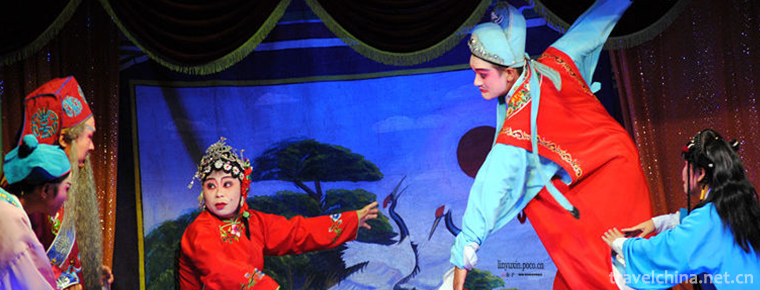
-
Hunan Provincial Museum
Hunan Museum is the largest museum of history and art in Hunan Province. It covers an area of 49,000 square meters and has a total floor area of 91,000 square meters..
Views: 121 Time 2019-01-16 -
Puning Temple
Puning Temple is located in Chengde City, Hebei Province. It was built in the Qianlong period of the Qing Dynasty. The first half of the temple is Han-style,.
Views: 155 Time 2019-02-07 -
Xiaolangdi Dam
Xiaolangdi, the Yellow River Xiaolangdi, is located in the Yellow River Xiaolangdi Scenic Area at the junction of Luoyang City and Jiyuan City, Henan Province..
Views: 315 Time 2019-02-25 -
Baisha Xile of Naxi Nationality
Naxi Baisha Xile is also known as "Xiaoli at breaking time", "Xiaoli at breaking time", "Xili at breaking time", "Xili at breaking time" and "Xie Li at bre.
Views: 242 Time 2019-06-06 -
Qiang Mu Zashrunbu Temple Shigatse
Qiang Mu is a religious dance, also known as "Dancing God". "Semochim Qiang Mu" is a Tibetan Buddhist Gru-sect Qiang Mu performed by monks at Zashrunbu Monastery in Xikaze, Tibet. .
Views: 102 Time 2019-06-11 -
Shaoyuan mythological group
Shaoyuan myth group is one of the ancient Chinese myths and legends. Refers to the general name of the creation myths and mythological prototypes circulated in Shaoyuan Town, Jiyuan City, Henan Provin.
Views: 152 Time 2019-06-14 -
Wuyin Opera
Wuyin opera has a history of nearly 300 years. Its singing style is graceful and charming. It is known as "Northern Yue Opera". Its occurrence, development and finalization have gone through.
Views: 133 Time 2019-06-29 -
Xuanbi Production Skills
Xuanbi has a long history. Originated in the Qin Dynasty, it flourished in the Tang and Song Dynasties. At the end of Song Dynasty and the beginning of Yuan Dynasty, there were frequent wars, and the .
Views: 143 Time 2019-07-09 -
Zhang Daqian
Zhang Daqian (Chang Dai-Chien, May 10, 1899 - April 2, 1983), formerly known as Zheng Quan, was renamed as yuan, Ji Yuan, Hao Da, alihao Dai Ju Shi, Xia Li Hong Kong people, Zhai Da Feng Tang. Sichuan.
Views: 292 Time 2019-09-04 -
Xiling Snow Mountain
Xiling Snow Mountain, located in Dayi County, Chengdu City, Sichuan Province, is only 95 kilometers away from Chengdu, with a total area of 483 square kilometers. It is a world natural heritage, giant panda habitat, AAAA tourist attraction and national key scenic spot..
Views: 321 Time 2020-11-06 -
Deyang Education
By the end of 2018, Deyang had 856 schools, with 33000 full-time teachers and 543000 students. Among them, 339 primary schools enroll 32000 students and 185000 students; 123 junior high schools, 28000 students and 80000 students; 23 senior high schools.
Views: 332 Time 2020-12-14

